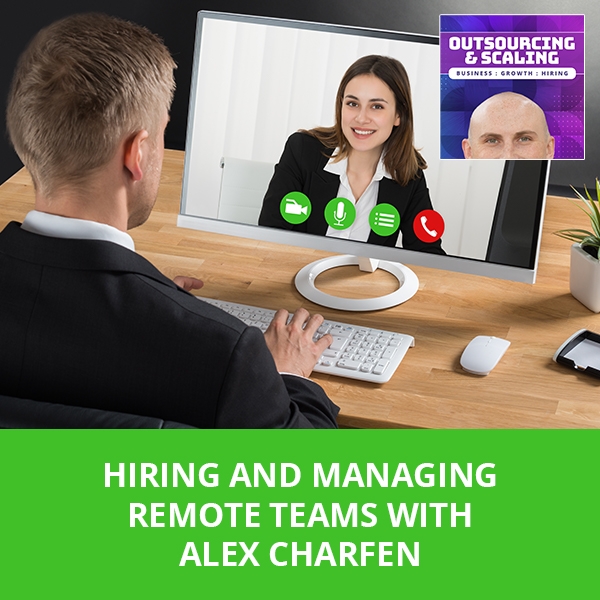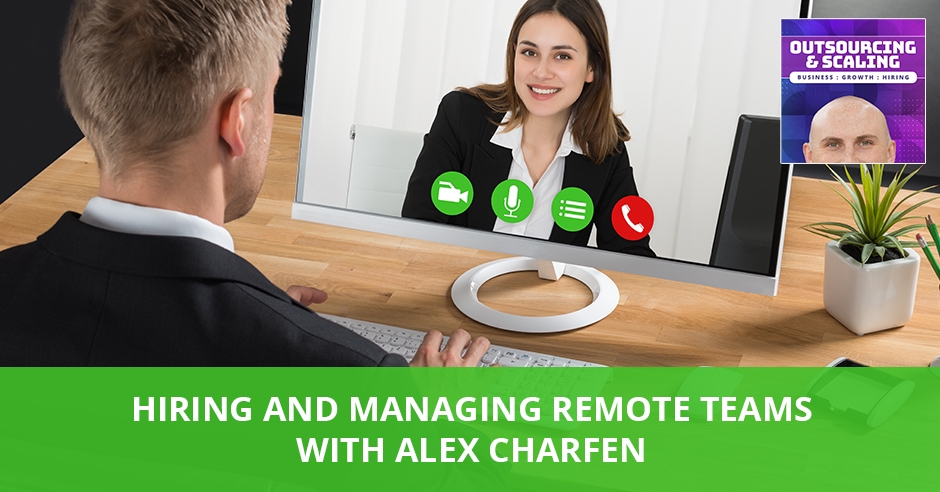


—
Listen to the podcast here:
[smart_track_player url=”https://www.podetize.com/statsapi/www.podetize.com/wp-content/uploads/fileuploads/11-5b145ef137b51b3d1af0633e9305c43d/07/2019/4c9f2fd95a12a205fd6ee3ff56c16538.mp3″ title=”Hiring And Managing Remote Teams with Alex Charfen” ]
Download the audio file here.
Hiring And Managing Remote Teams with Alex Charfen
Alex Charfen is Cofounder and CEO of CHARFEN, a training, education and membership organization for entrepreneurs and small businesses. Alex has dedicated his life to answering the question, “How do you make businesses grow?” which evolved into a larger calling to understand, “How do you help people grow? This transition led him to undercover a previously mislabeled and misunderstood population among us, the Entrepreneurial Personality Type, EPT. For the past two decades, Alex has created and curated proven business philosophies, models and strategies geared specifically to entrepreneurs. As an expert in business growth having personally consulted for billionaires, Fortune 500 and Global 100 companies, Alex is invited to share his strategies with businessowners around the world. He is regularly called upon by major media outlets including MSNBC, CNBC, Fox News, The Wall Street Journal, USA Today and The Huffington Post to provide his unique and valuable insights. Alex and his family live in Austin, Texas. Alex, thank you so much.
Thanks for having me.
Thanks for being here. You’re someone that I look up to in the space. You’ve built a lot of remote teams, which is what this podcast and my business is all about. I’m excited to dive into that. Let’s take a gigantic step back. What was you like growing up? Were you an A student? Were you a rebel? Walk us through that.
That’s a curveball, Nathan. For me, growing up I wasn’t a rebel nor was I an A student. I was just confused. I was the kid that was fundamentally different than the rest of the kids. I didn’t get along very well in school. I didn’t get along socially but when I was about eight-years-old, I started working with my dad and the one place that I felt comfortable was in business. It wasn’t glamorous or anything cool. My dad and I worked at a swap meet. In some places in the country they call it a flea market. Up until I started working with my father, I was terrible at everything. I remember being terrible at school. I remember being terrible at talking to other kids. I remember feeling broken because I was bad at this stuff that looked automatic for everybody else.
When I started working with my dad, I remember the first day that we were in the flea market, a woman walked out and bought something from me and there was this feeling of like, “Maybe I can do something and I’m not terrible at everything.” From that point on, I was the kid who had the business in grade school, then junior high, then high school. I had a candy selling business at junior high. In high school, I had a window washing business that got shut down because I wasn’t old enough to own it. In college, my friend and I started a financial consulting firm that we sold. I’ve never fit into anybody else’s rules, so I had to make my own as an entrepreneur.
You went to college. Did you graduate from college?
No. I went to six different schools in Southern California. I took a lot of business courses and every time a school would want me to take like the history of Latin American literature or something like that, I’d bail out of that school and go to another one. I go to school as long as I didn’t have to take general education, but I did take some business classes.
Do you think that school is not for everyone? Obviously, you’ve had a lot of success without it. Do you think there’s a time and a place for people to go through their traditional high school or college?
A remote team is infinitely more scalable, easier to grow, and a lot more fun to run.
I think if somebody wants to be in a profession where you have to have a degree, then that’s the only excuse to spend time in school. Let’s get real. Look at the statistics. Over 50% of what you learn in a business degree is five-years-old as you’re learning it. You’re actually learning history when you’re supposed to be learning how to move forward. When it comes to business or entrepreneurship, no, I don’t think a college degree is necessary. It can get in the way and make you look at things in the wrong way. If you want to be a chiropractor, a doctor, a lawyer, something where the degree is necessary, then of course you have to go to school. Whenever somebody says, “I’m going to school,” and I’m like, “What are you studying, entrepreneurship?” I laugh in the back of my mind because it’s an oxymoron. It doesn’t make sense to me that you’d be in school trying to study entrepreneurship. Who are you learning from, somebody who got a degree and sat behind a desk and does nothing? It would be like learning sports from the guy who can’t throw a ball. If you’re in college learning entrepreneurship, it’s wrong.
I studied entrepreneurship in college. What’s funny is most of the stuff I didn’t learn, but the whole college experience, I wouldn’t trade for anything. I feel like I learned how to be on my own and take care of myself and all that stuff.
A lot of people say that. You learn social skills in college. I look at it very similarly. I ran several different businesses when I was in college. I didn’t attend college and did all the social skills and all that stuff. I didn’t go to parties. I didn’t have a lot of friends, but I spent that same time socializing and learning social skills through growing businesses.
I was running a business while I was in college. I was taking parts of it and moving it over and figuring it out. If I could do it all over again, the degree probably wasn’t good for the business. It was obviously a great four years. When you started your first business, are you someone that goes into business doing trial and error and trying to figure it out or are you doing a lot of research? Are you trying to learn from others that had been there? Where do you fit in on that spectrum?
When I was younger, it was trying to figure out an opportunity and make it work. I think it was more out of necessity than anything else. We started the window washing company because I saw an opportunity. I saw somebody else window washing. I didn’t think they were that good at it. A year later, I had three trucks with people window watching. When I was in junior high school, I started selling candy to the other kids because I saw an opportunity. When it comes to entrepreneurship, I can’t say that I ever had anything well-planned out or there was a ton of forethought going into it. It was more like how I can make money in the present. These days, my businesses are completely different. We plan like crazy. It’s what we teach. Everything we do has a strategic plan. Everything we do has outcomes and has a scoreboard. We know exactly who’s responsible for what, but when I was younger it was definitely just trying to make my way in the world.
When did you hire your first person? How old were you and what did you learn?
Theoretically, it was in junior high. What I was doing in junior high, my mom would take me to a warehouse store and I would buy a bunch of candy that costs me anywhere from $0.05 to $0.07 apiece. I was selling it for $0.25 to $0.50 apiece. There were about 1,100 people in my junior high school, so I couldn’t handle it all by myself. I had two other guys that worked with me. A few months later, I got a third guy and I stopped selling candy. I just collected the money. I don’t feel like that was an employment relationship, but in the financial company that my friend and I had in college, we had team members. When I started my consultancy at 21, that’s when I had to start building real teams.
Is there any kind of horror story or bad hiring experience that stands out to you?

Katie and I looked at it one time. I think we’ve employed it in businesses just in Austin, over 300 people in person. In all our businesses total, when you include contractors, it’s probably over 1,000 people. I’ll give you my best horror story, Nathan. We had a director of marketing that we hired. We were a little concerned with him coming in, but we still checked references and stuff. The guy was with us 76 days. We terminated him because a team member came to us and said that the previous night he had been with the executive in our company and he was drinking beer and driving down the freeway at 105 miles an hour. We’d already had other complaints about them. We sat down with him and terminated him. He filed a lawsuit against us in federal court in Texas because we fought his unemployment insurance but it gets better.
He filed a handwritten lawsuit, he wrote a lawsuit on the top. He sued me, Katie, our company, Rick Perry, who was the governor of Texas at that time and the State of Texas and the federal government. He handed in a holographic lawsuit. I had to hire an attorney to go to court and stand up and so did Rick Perry. It was my attorney and Rick Barry’s attorney and the office of the governor of Texas. They had to stand there while the case got thrown out of court. I had to pay an attorney $800 to stand there while this handwritten lawsuit was thrown out of court. The judge told the guy who used to work with us that if he ever filed a lawsuit like that again, he’d be held in contempt and would do time behind bars. That’s one of my best horror stories.
I’ve met your assistant, Haley. She’s awesome. I know you guys have a pretty long and intensive hiring process. It seems to work. You seem to have a pretty good idea of what you’re looking for. How long did it take you to build out that process and how has that evolved over time?
It’s a process that I’ve been working on for over twenty years. The way that it’s evolved over time is it’s gotten clearer and we don’t skip steps. I also have to make the admission that I skipped some steps and made a huge mistake. The important parts of our process are this. One, we put out a job and we look at a lot of applications. We screen like crazy because that initial screening of all the applications gives you the idea of what’s available. It also gives you an idea of what the pay range is. You thought you knew that going in but then it gives you a lot more when you screened a bulk of applications. We have everybody who applies with us do a DiSC profile so we know their personality tendencies coming in.
We do a cultural interview, which is about fifteen minutes where we understand more about the person. If they pass that, then they go into a skill set interview where we talk to them about the position. They do a test, then they interview with our executive team and then if they get through all of that, they’re hired. I think that the key for me over the years is we’ve become more committed to the process. Nathan, hiring is one of those things where it’s so easy to take a shortcut. You’re looking for a salesperson, you have a bunch of resumes, you talk to somebody who’s great and you’re like, “I should just pull the trigger.” Whenever we’ve done that, sometimes we’ve gotten away with it, but more often than not, a month later we’re having a conversation like we should have followed our process.
Is it the same process whether it’s a virtual assistant in the Philippines or US assistant person?
It’s very similar. Here’s how we look at it. If we’re bringing in somebody who’s going to be a W-2 team member, there’s a little bit more rigorous of a process but here’s why we feel the same way. Nathan, you’ve helped us find three extraordinary team members in the Philippines and my whole team loves them. We’ve had trouble hiring in the Philippines before, getting a good skill set match and a good cultural match and people who want to get things done. The people that you’ve found us have been extraordinary. I know we put them through the same process with you, which doesn’t make it super easy on you. Here’s why that’s so important. I think a lot of CEOs don’t realize that anytime you add a member of your team, whether it’s a contract, outsource international, the rest of the team assimilates that member.
If you treat people like they’re disposable, your team will feel disposable. Even if we’re bringing in a contract member from the Philippines, as an example, one of the people who you helped us find, we use her as an independent contractor, not introduced to our team for about a month to make sure that it was going to work. Once we felt comfortable with her, we brought her into our team huddles. We brought her onto the team officially. Not only is it the same, regardless of where we are but we’re just as rigorous because here’s what’s important to me. Once somebody comes onto the team, they stick.
The vast majority of human beings want to win. They want to be productive, recognized, and part of a winning team.
It’s so important in reducing turnover in general. A lot of people reading, either they’re hiring for the first time or remote or maybe they have internal staff and they’re trying to figure out how you mix the virtual with the in-person. Do you have any tips or advice for them?
What you’re talking about is a hybrid team. If you’re a brick and mortar or an in-person business where everybody’s in the same location and you’re not running a hybrid team yet, you’re missing the insane and massive profit-exploding opportunity. Here’s why. One, if you’re a brick and mortar and you’re in a locale and you don’t have any remote people, then you are limited by the IQ of the area that you’re in. On my team, I have people throughout the United States, Canada, Ireland, Australia and the Philippines. I hire talent. When I find somebody who was extraordinary, we hire them. It doesn’t matter where they’re located. One of the biggest challenges with having an in-house brick and mortar is that you’re limited by geography and I went through this.
Katie and I, we never got to a hundred in person. We got to 97 or 98 and it was brutal. In order to hire somebody in-house in Austin, we had to find someone who already lived here or we got to the place where we were relocating people. If you think it’s hard to have a team, start relocating people. There’s the pressure of relocation. There’s the expense of relocation. It puts all this load on the opportunity and load on the person. Running a hybrid team is a game changer. Here’s what you need in order to run a hybrid team. You need a system where you have a clear strategic plan. Every person on the team knows exactly what it is.
Each person on the team knows what they’re accountable for, what they’re responsible for and what’s expected of them. You have systemic scoreboards for the company, for each department, for each project and for each person. If you have those things, I can manage a team on Mars the same as I could in the next room. In fact, I’d rather they were on Mars theoretically as long as they live there because I don’t like having a lot of people around me. I get overwhelmed with a lot of humanity, a lot of people, a lot of details, a lot of questions and interruptions. For me, a remote team is infinitely more scalable, easier to grow and a lot more fun to run.
Talk to me about communication. Are you communicating with a few people and they communicate with everyone else? Those people, is it consistent throughout the day or are you just check in with them in the morning? How do you communicate with everyone?
This is what we do as a company. As an organization, we show entrepreneurs how to do three things. We have coaching programs where we show entrepreneurs how to create a clear strategic plan, a communications structure or system and then a process to consistently hire the right people, do the right projects and document the right processes. If you can do those things, you’re going to grow your business like crazy. The way that we communicate with our team is through what we call a cadence. Each week we have the same meetings. As far as people management, we use a traditional org chart. Whoever is your supervisor on the org chart, if you work in our company, you meet with that person every week for what we call a weekly check-in and everyone on our team turns in a weekly report.
If you’re on our team in any given week, you’re going to be in a weekly meeting where you get your commitments, where you know what is going to be done for the week. You have a weekly check-in where you’re talking to your supervisor. At the end of the week, you write a weekly report and we open it back up the next week. Each week has that rhythm, “You know what you’re going to do, you get help throughout the week and you tell us what happened at the end of the week.” As a result, the companies that Katie and I had grown have grown fast. We put our last information products company on the Inc. 500 list. We were number 21 in 2011. We were number 187 in 2012, and I can’t remember where we were in 2013. We were bankrupt in 2007. In ‘08, ‘09, ‘10, ‘11, we were growing a business and in 2011 we were number 21 fastest growing company in the country. When you have these systems, it works like crazy.
You work with a lot of businesses. Where do you see them fail in that process? What are the most common mistakes you see people make?

The biggest mistake that entrepreneurs make is that they treat their multi-six figure business like they did their solopreneurship and they never make the transition. Let’s put reality out there. As a solopreneur, you can decide what to do on a daily basis. You don’t even have to plan more than a week or two. If you get the leads and you sell and you do the right things on a daily basis, you’re going to win. When you start building a team, when your business grows, when you get to that multiple six-figure business and start approaching seven-figures to go beyond seven-figures, you have to dynamically change how you run the business. It’s not about you anymore. In fact, you have to solve the biggest entrepreneurial problem that we solve. If you’re an entrepreneur, this is your biggest problem. As your business grows, you have to make increasingly difficult decisions and nail them most of the time with a high percentage chance of success with less and less inflammation. That is a constant.
The more your business grows, the more important the decisions are, the less information you have. You’re actually at an increasing disadvantage as an entrepreneur. If you don’t put a clear strategic planning system in place, a communication system in place and analysis system in place, you’re dead in the water. There’s a reason why the vast majority of entrepreneurs never grow their business. There are 29 million businesses in the United States. Twenty-four million are under $300,000 and 22 million are under $100,000. The vast majority of people never get there. The 29 million businesses in the United States, just under 26 million are under $1 million. To get to $1 million, that’s the 3% club. Only 3% of businesses ever get there. I think the biggest issue is entrepreneurs don’t have a strategic plan. They don’t have a system to communicate with their team and they don’t consistently look at, “Who do I hire? What do we do and what do we get done? If you do those things, everything changes.”
Do you have that same approach if you’re doing $5 million, if you’re doing $10 million or does that change and evolve over time?
No, it’s the same. Here is the issue with so much of what his coach for entrepreneurs is that entrepreneurs are given frameworks or systems that are temporary and expire. There are a lot of frameworks that will get you from $100,000 to about maybe $200,000 or $300,000. There’s a lot that will get you from $300,000 to maybe $700,000 or $800,000 and $1 million, but they break and they fall apart. Here’s the challenge with growing a business. What I tell people is that growing a business in $1 million is like flying a plane while you’re changing the engines in midair and you’re taking on passengers. If you don’t have a framework and a system to run the business, it’s going to take you all the way to $100 million. That means at some point in time in the chaotic growth that you’re experiencing, you’re going to have to stop everything and fix your system. You’re dead in the water.
If you’re a $10 million business and you realize the fundamental frameworks you’re running on don’t work anymore, you’re screwed. We would never teach anything like that. In fact, we’ve had people take our frameworks from a couple of million dollars all the way to $50 million or $60 million. We’ve had people take our frameworks from $400,000 or $500,000 to $5 million or $6 million. We’ve proven that our stuff indoors, regardless of how big the business gets. Here’s why that’s so important as an entrepreneur. The hardest thing you do is the unique deliverable of your business. Nathan, for you, it’s placing people in companies that need them and making sure that they stick and that they’re productive. That’s what you should be focusing most of your time. We help businesses with the planning, the structure and making sure you’re analyzing in the company, right?
You’re right. You hear a lot of gurus are like, “Structure it here and then once you get to this point, you’ve got to restructure it.” If you just restructure it from the beginning so that you can take on all that scale, it makes a lot of sense. How do you motivate people? Especially as you get bigger, as you get farther away from talking to every single person, your team becomes bigger. You’re not in every single meeting. How do you keep everyone focused and motivated?
I’m already there, Nathan. On my team, I don’t talk to everybody. I’m not in every single meeting. In fact, I do it by design because if I have to be in everything to make sure that people are motivated, I’m screwed from the beginning, so I don’t. I have a fundamental belief that people want to win. I think the vast majority of human beings want to win. They want to be productive. They want to be recognized. They want to be part of a winning team. I start with the belief that the people we hire want to win, and then we also screen for people who are true believers. Here’s what I mean by true believers. There are three different levels of true believers. The highest level of true believer knows who I am and believes in who I am. They know who our company is and they believe in the products we put out. They knew who our clients are and they believe in what our clients do.
I’m looking for somebody who believes in Alex Charfen and our podcasts, our message and who we are. I’m looking for someone who believes in Charfen as a company and our coaching products who believes in coaching that it’s like a valid thing. I’m also looking for people who love entrepreneurs and want to help them grow their businesses. Nathan, in some cases we can’t find all three. In the Philippines, nobody knows who I am but we find people like Orvi, Arnold and Hazel who you’ve helped us find who love entrepreneurs and love helping entrepreneurs. They’re true believers in who we help and they’re also believers in coaching and consulting and information products. In fact, the people that you’ve found for us have actually come in and gone through all of our content and they’re applying it. They’re looking at it themselves because they actually care and they believe and they want to win. For me, motivating people is about hiring people who already care about what the company’s doing. What I always tell entrepreneurs is if you hire true believers, you will never have to motivate them. Hire anybody else and you will never motivate them enough.
Entrepreneurs are fundamentally different. They put up with the criticism, vulnerability, and backlash it takes to challenge the status quo.
I think a lot of people reading are thinking, “Why does Alex Charfen use virtual assistants?” You’ve got virtual assistants from FreeUp. What are you actually use them for? Can you give people a sample of what tasks or what projects you have them on?
We use a limited amount of technology platforms, but we go deep on the platforms that we’re in. We use Process Street for process documentation since we have a virtual team. It’s like having paper checklists all around the world. We use Airtable, which is a like an enhanced, very easy to use visual programming database. It’s like Excel but far more capable than Excel. We use some learning platforms on our website. When I look at the people who you’ve helped us find, they all own one of those platforms and they’re integrated into our team. Nathan, when you say virtual assistant, we say it’s another team member. For us, they’re another member of our team. They have a 4R document. We recruit and then we also manage through what we call 4R documents. It’s the person’s role, responsibilities, the results they drive and the requirements for the role.
Each one of the people that you brought us has their own 4R document. For us on our team, it’s not where you live and what your official title is, like a virtual assistant. You’re another team member. One of the things that I love is when we get on a huddle or we get on one of our targeted interactions or we get our team together and one of our international team members gets called out. You can tell it means a ton to them and you can tell it means a ton to our team. For us, we look at what do we have to do and what’s the most effective way we can get it done.
Honestly, I love the fact that we can use people who are in the Philippines and work with people who are in the Philippines because I’m an immigrant in the United States. I was born in Mexico City and I know how hard it is internationally and what an incredible privilege we have here. If we can give someone in another country, especially a country with leadership as crazy as the Philippines and all the crap that they’re going through down there. If we can give them a stable opportunity where they feel they’re a productive member of a team, to me there’s a bonus there. It feels good as a human being.
I always say, one of my coolest moments was when I went to the Philippines and I had a conference with people in FreeUp. People were showing me pictures of their houses, their cars and all this stuff they were able to purchase with the money that they got from FreeUp. That was cool. There was nothing that tops that. I want to talk a little bit about the Entrepreneurial Personality Type. I know you talked about it a lot. Can you give our audience a little breakdown of what that is?
The Entrepreneurial Personality Type is a concept I came up with. I actually wrote the book. You can go to Free Momentum Book to get a free copy or you can go to Amazon and look up The Entrepreneurial Personality Type and you can order a copy via Prime. My theory is that we’re not like the rest of the world. Entrepreneurs are fundamentally different. When you look at the Entrepreneurial Personality Type, we are that tiny percentage of the world that performs the miracle of going into the future, imagining a new reality coming back to the present and insisting it becomes real. We will put up with the criticism, the vulnerability and the backlash that it takes to challenge the status quo. Why? When I look at us, I think we’re fundamentally different than everybody else. To me, there are four types of people in the world. I’ll let you pick which one you are. Nathan, I’ll test you so everybody can follow along. The first type of person in the world is the caretaker. This is a person who likes to take care of other people. Here’s what’s interesting. A lot of times when I share this, entrepreneurs go, “That must be me because I like to help people. I like to work with people. I like to give people opportunity.” like you do, Nathan but there is a disqualification question. You are disqualified by the question. Nathan, do you like to change bedpans?
No.
Most of the time when I ask an entrepreneur that question, they give a little chuckle and a laugh. If you’re in the same room as a caretaker and you say, “Did you enjoy changing that bedpan?” They will look you straight in the face with congruency and say, “If that person needed a bedpan change and I was here to be of service, I feel fulfilled.” It’s a caretaker, a totally different personality type than you and I.

I have cousins that are nurses and they would probably answer yes to that question.
Then they would think we were weird for laughing and saying no. They’re like, “Are you going to leave the person there with the dirty bedpan?” I’m like, “I’m running for my life.” The second type of person is the communicator. A lot of entrepreneurs say, “I must be the communicator.” Communicators love the act of communication. They like to communicate, carry on oral tradition. Throughout history, did we need the caretaker? Absolutely, because guys like Nathan and I, we would have left you high and dry. Did we need the communicator? Yes because we needed somebody to say don’t go over there. There’s a woolly mammoth. Don’t go over here, you’re going to die from a cliff. Here are the qualification questions. Nathan, do you enjoy small talk?
No, I want to get right to the point.
You’re not a communicator. Most entrepreneurs do the same thing as small talks. Screw small talk. If I get into small talk situation especially if my back is against the wall, I’m thinking things like, “Do I stab my leg? Do I fake a heart attack? What do I do?” Literally, I’ll start sweating over small talk. Put me on stage in front of 8,000 people and my heartbeat is normal. If you start small talk with me, I’m completely freaking out. I’m not that type of person, but you put two communicators at a water cooler, they will talk for 45 minutes about a half hour TV show. I didn’t even know that was possible. The third type of person is what I call the coordinators. Coordinators are the ones who like order, logic and red tape. They like contracts not because there’s a deal. I like contracts when there is a deal. Coordinators like contracts because there’s a contract. If we’re going to have conflict, most of the time it’s going to be with the coordinator. Here’s the qualification question for a coordinator. Do you enjoy sitting on committees?
No.
With the Entrepreneurial Personality Type, we’re like, “Screw the committee. Get him out of my way.” When somebody goes, “Come to order,” I want to punch somebody. I’m out. Don’t you get reactive to that physically?
Yes, 100%.
You talk to a coordinator and they will list for you with pride all of the committees they sit on in the chairmanship they have in the other stuff that doesn’t matter. It does, I’m a little judgmental. We need coordinators but for me, coordinators are some of the hardest people to get along with because they don’t look at the world like we do. In fact, if you look at coordinators, one of the biggest things they’re trying to do is red tape and legislate and slows us down and makes it so that we can’t do what we want. Coordinators are all about maintaining the status quo and as an entrepreneurial personality type, we aren’t. If you look at the four types of people, we’ve got the caretaker, the communicator, the coordinator and if you look at our evolutionary tribe, we have somebody who’s going to take care of each other. We’ve got the person who’s going to carry on oral tradition, the person who’s going to keep things straight. What group of people is missing in the human race?
Every single person who ever matters to you is your tribe.
The entrepreneurs.
Right, but I would call us the evolutionary hunters. My theory is that the modern-day entrepreneur is the evolutionary hunter. We were that small percentage of the population who got up every morning and made sure the tribe stayed alive. We got up and said, “I wonder what’s over there. Can I conquer? Can I make something happen?” We got up every single day and went through the human risk and sacrifice of going out and risking our lives to make sure that the human race endured and we still do. The qualification for the evolutionary hunter, the question is, can you turn it off?
No, never.
What group of people on this planet, whether you believe in evolution or intelligent design or creation or whatever it is, it doesn’t matter because the group of people on the planet who can’t turn it off are also the ones who are preprogrammed to keep the human race alive. To go out and hunt, to risk our lives, to risk vulnerability. To put ourselves at a massive personal sacrifice to make sure that things move forward and that we are all in momentum. That’s my theory on the Entrepreneurial Personality Type. I believe that entrepreneurs are the only consistent source of positive human evolution and we always will be.
You’re pretty open that you were bullied in school, a little socially awkward, whatever you want to call it and you had that entrepreneurial personality type. There’s probably someone reading who is in that boat. Maybe they lacked self-confidence. They see you, you have these teams. You’ve sold these businesses. You are speaking at Funnel Hacking Live. What advice do you have for them?
Here’s what I know about every single one of us. Everyone who’s like me and who has been told to sit down and stop talking and stop making everyone else uncomfortable and been told that we are less than, broken, disabled, disordered in all kinds of things, that is the rest of the world telling an evolutionary hunter that we’re making them uncomfortable. Here’s my advice to you. Take a moment. Take a deep breath and think through the history of everyone that you’ve ever cared about, everyone who has ever mattered to you. What names stand out for you? I know who they are for me: Pythagoras, Einstein, Plato, Socrates and all the incredible people throughout history that made today possible. When I think of people like Harriet Tubman, Albert Einstein, Edison and the people in Tesla. The men and women who got up every day and created and made things new and moved us in a direction.
I want you to think of every single person who ever matters to you and then I want you to accept the fact that is your tribe. That is who you are. That is your destiny. Every person I’ve mentioned and anyone throughout history who’s ever stood out has felt just like you and I alone and isolated and like a party of one. I want you to know something. There is nothing wrong with you and you are not alone. Because throughout history, the person that was broken like Einstein failing algebra. The person who couldn’t make it like Edison getting kicked out of school. The person who didn’t have what it takes, the person who didn’t have everything, the person who was less than, who is disabled, who was broken, who couldn’t see, who couldn’t speak, who couldn’t hear like Helen Keller. Those are the people who have gone on to change the world. You are part of that tribe. You are one of us. Don’t let anyone ever tell you that you can’t go out and change the world because I know you hear that quiet voice in the back of your head saying, “You can do more, you can be more and you can leave more behind.” I want you to know something. That voice that you sometimes have thought is crazy is the most rational part of you. Lean into it, go forward, create momentum and change the world.
Alex, thanks so much for joining us. Where can people find out more about you and what are you excited about?

Nathan, we’re pumped about our podcast. It’s exploded. We’ve got about 1.4 million downloads. If you related to what I’ve said, we’re about to hit 1.5 million. You can go to MomentumPodcast.com. That’s a great place to start. If you’re a businessowner and you’re interested in finding out where you are and what’s going on for you, go to BillionaireCode.com and download our framework that will show you exactly where you are on the path to entrepreneurial success. Where you should be focused and just as importantly what you should be focused on next.
If you’re looking to grow your business, grow your team, hire better and scale, there’s no better person than Alex Charfen. Alex, thanks for joining us.
Nathan, I want to thank you for the effort you’ve put into finding people for us and for finding us people who are so incredibly productive. The team members that we’ve gotten from FreeeUp, they’ve been like plug and play. They’ve come in and within a week or two, they’re completely productive and they’re excited to work with us. They’re on our daily huddle. For a lot of people, they call them a VA. We call them another member of our team and we love him. Thank you for what you do. For giving people an opportunity and for all you’ve done to help us.
Thanks so much. It means a lot coming from you.
We’ll talk to you soon, Nathan.
Important Links:
- CHARFEN
- Process Street
- Airtable
- Free Momentum Book
- The Entrepreneurial Personality Type
- MomentumPodcast.com
- BillionaireCode.com
About Alex Charfen
 Alex Charfen is co-founder and CEO of CHARFEN, a training, education and membership organization for entrepreneurs and small businesses. Alex has dedicated his life to answering the question, How do you make business grow? which evolved into a larger calling to understand How do you help people grow?
Alex Charfen is co-founder and CEO of CHARFEN, a training, education and membership organization for entrepreneurs and small businesses. Alex has dedicated his life to answering the question, How do you make business grow? which evolved into a larger calling to understand How do you help people grow?
This transition led him to uncover a previously mislabeled and misunderstood population among us: the Entrepreneurial Personality Type™ (EPT).
For the past two decades, Alex has created and curated proven business philosophies, models and strategies geared specifically to entrepreneurs.
An expert in business growth having personally consulted for billionaires, the Fortune 500 and global 100 companies, Alex is invited to share his strategies with business owners around the world. He is regularly called upon by major media outlets, including MSNBC, CNBC, FOX News, The Wall Street Journal, USA Today and The Huffington Post to provide his unique views and insights. Alex and his family live in Austin, Texas.
